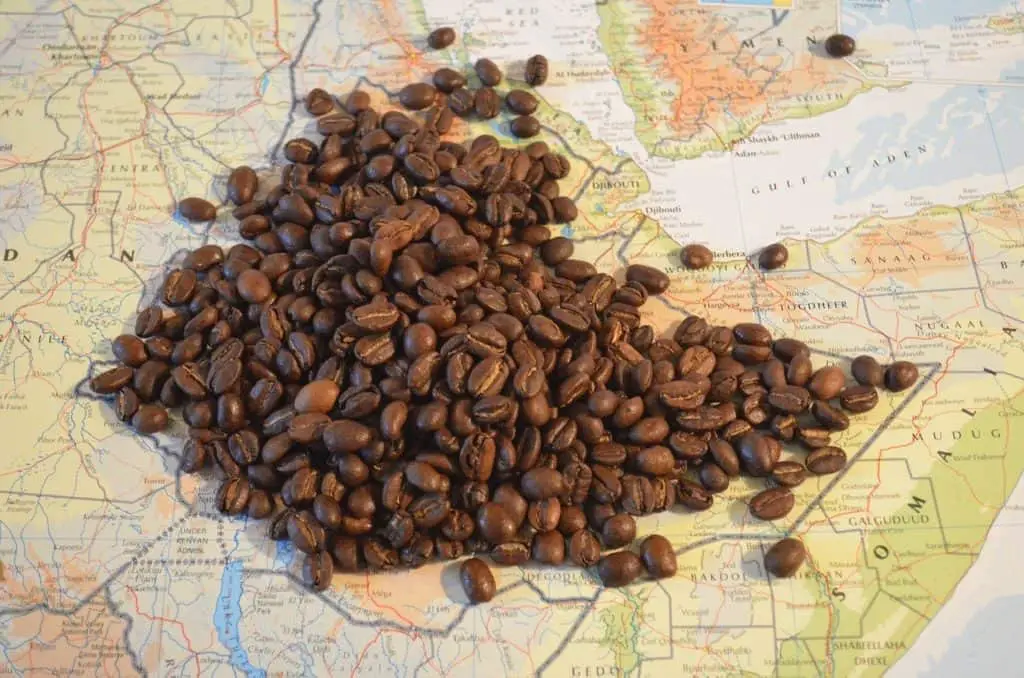
Yemeni coffee is a treasure. Its bold, complex flavors, shaped by centuries-old farming methods, make it one of the world’s priciest brews. Limited harvests from small family farms, minimal modern infrastructure, and tricky transportation from rugged mountains to ports drive up costs. Yet, these challenges create a coffee unlike any other. Let’s explore Yemen’s coffee story—its history, how it’s grown, its taste, and its place in today’s market.
The Roots of Coffee Trace Back to Yemen
Coffee’s story starts in Ethiopia, but Yemen turned it into the drink we know today. Around the 6th century, nomadic tribes in western Ethiopia noticed coffee’s stimulating effects. By the 15th century, Yemeni Sufi monks were brewing it to stay awake during long nighttime prayers.
They called it qahwa, an Arabic word for wine that later became “coffee.” Yemenis refined coffee into a commercial crop, and by the 1500s, they were exporting it to Turkey, Persia, and Egypt through the port of Mokha. This port gave us the term “Mocha,” now synonymous with chocolatey coffee flavors.
For 200 years, Yemen held a monopoly on coffee. To protect their trade, they boiled or partially roasted export beans to prevent germination elsewhere. But in the 1600s, a pilgrim named Baba Budan smuggled seeds to India, breaking Yemen’s grip. From there, coffee spread to Java, Europe, and the Americas.
Today, 90% of the world’s coffee—especially Arabica—traces its genetic roots to Yemen’s Typica and Bourbon varieties. These beans, first cultivated in Yemen, are the ancestors of most modern coffee plants.
How Yemen Grows Its Coffee
Yemen’s coffee farms are a step back in time. Small family plots, often terraced into steep mountainsides, dot the landscape. These terraces, carved like staircases, mirror tea fields in Asia or vineyards in Europe. Farmers work at altitudes of 2,400 meters, where cool air and dry conditions coax out rich flavors. Unlike industrial farms, Yemen’s growers avoid chemicals, relying on natural methods honed over 500 years.
Ripe coffee cherries are hand-picked for quality. Instead of stripping beans from the fruit immediately, farmers dry them together—a method called natural processing. Cherries are spread on rooftops or in caverns for weeks, letting the fruit’s sugars infuse the beans. This creates irregular, rough seeds with a distinct, robust aroma. After drying, the husks are removed, often ground by donkey- or camel-turned millstones. Only the most flavorful, aged beans are exported, adding to their rarity and cost.
Yemen’s rugged terrain limits yields. While the country grows coffee in 80% of its regions, production is low—around 9,000 tons annually, down from 50,000 tons in the late 19th century. Compare that to Brazil’s millions of tons. Low water, pests, and high labor costs keep output small, but the quality shines through.
Where Yemen’s Coffee Thrives
Yemen sits on the southern tip of the Arabian Peninsula, bordered by Saudi Arabia and Oman. Its mountainous interior, rising sharply from the Red Sea coast, creates ideal coffee-growing conditions. The Bab-el-Mandeb Strait links it to global trade routes, making the port of Mokha a historic hub. Coffee flourishes in regions like Sanaa, Al Mahweet, Hajjah, Sa’dah, Yamah, and Al Hodaldah. These areas vary in altitude, giving each region’s coffee a unique twist.
The table below highlights Yemen’s key coffee-growing regions and their flavor notes:
| Region | Altitude (meters) | Flavor Notes |
|---|---|---|
| Sanaa | 2,200–2,500 | Chocolate, wine, high acidity |
| Al Mahweet | 2,000–2,400 | Fruity, floral, balanced |
| Hajjah | 1,800–2,300 | Earthy, spiced, full-bodied |
| Sa’dah | 2,000–2,500 | Nutty, malty, smooth |
| Yamah | 1,900–2,400 | Berry, citrus, bright |
These variations come from soil, altitude, and microclimates, making Yemeni coffee a taster’s delight.
Yemen’s Signature Flavors
Yemeni coffee is a flavor powerhouse. Its earthy base mingles with dried fruit, cinnamon, cardamom, and chocolate. Some detect tobacco or wine-like acidity, especially in Matari coffee from Bani Mattar, west of Sanaa. Matari is bold, with strong chocolate and wine notes, appealing to those who love intense brews. Ismaili coffee, grown centrally, is gentler, with malty, smooth tones and smaller, pea-like beans.
Mocha beans, named after the port, are the crown jewel. Their deep chocolate flavor, buttery texture, and subtle fruit notes command prices of $60 to $240 per pound—two to four times other specialty coffees. These beans shine in medium to dark roasts, especially as espresso, where their richness stands out.
Yemen’s natural processing adds complexity. The fruit’s sugars ferment during drying, creating wild, full-bodied flavors. Typica beans, with clean, floral, and lemony notes, offer a sweet aftertaste. Bourbon beans lean toward creamy chocolate and fruit. Both varieties, born in Yemen, now grow worldwide but retain their Yemeni soul.
Yemen’s Coffee in Today’s World
Yemen’s coffee industry faces challenges. Civil war since 2015 has disrupted trade, with dangerous routes and high shipping costs. Production is down, and qat, a chewable plant, competes for farmland due to higher profits. Climate change brings rising temperatures and pests, threatening crops. Yet, Yemen’s coffee remains a lifeline for 150,000 smallholder farmers, especially women, who make up 75% of the workforce.
Despite hurdles, demand for Yemeni coffee is growing. Specialty coffee markets crave its unique flavors, and Yemeni-American entrepreneurs are bridging farmers to U.S. buyers. Recently, the Qima Foundation pushed for UNESCO to recognize Yemeni coffee as intangible cultural heritage, highlighting its global value. Sustainable practices, like organic farming and fair trade, help farmers earn better wages while meeting eco-conscious demand.
Yemen’s coffee culture is still very much alive. Coffee ceremonies, where beans are roasted over fire, ground with mortar and pestle, and brewed in a jabena pot, symbolize hospitality. Qishr, a spiced drink made from coffee husks, and kahwah, a tea-like brew from dried cherries, show Yemen’s resourcefulness. These traditions tie communities together, even in tough times.
Why Yemeni Coffee Stands Alone
Yemeni coffee isn’t just a drink—it’s a story of resilience. Its flavors, shaped by high altitudes, ancient methods, and a rugged landscape, are unmatched. From the monks who first brewed it to the farmers who hand-pick each cherry, Yemen’s coffee carries centuries of care. Whether you savor Matari’s bold wine notes or Mocha’s chocolatey depth, each sip connects you to a land that gave coffee to the world.
Today, Yemen competes with giants like Brazil and Colombia, but its small-batch, high-quality beans hold their own. If you’re hunting for a brew with history and soul, Yemeni coffee delivers. Check specialty roasters or Yemeni-American brands like Qima Coffee for authentic beans. Brew it carefully—medium roast, espresso-style—to let its flavors shine. You’ll taste why Yemen’s coffee is worth every penny.

